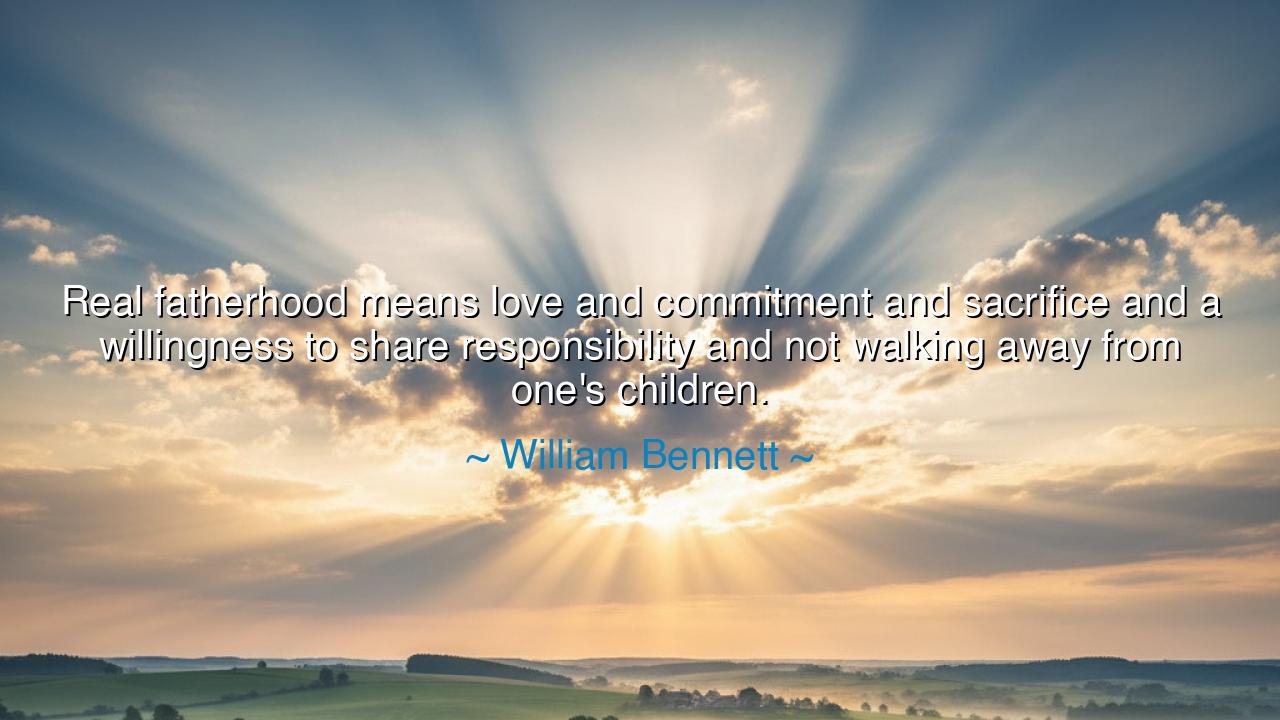
Real fatherhood means love and commitment and sacrifice and a
Real fatherhood means love and commitment and sacrifice and a willingness to share responsibility and not walking away from one's children.






Hear the noble words of William Bennett, the philosopher and former educator, who said: “Real fatherhood means love and commitment and sacrifice and a willingness to share responsibility and not walking away from one’s children.” In this profound statement lies the timeless wisdom of what it truly means to be a father. Fatherhood is not defined by biological ties alone, but by the sacrifice, commitment, and love one offers. The essence of being a father is not found in mere presence but in the depth of one’s engagement with the child — in standing by them through the trials of life and nurturing them to maturity with a steadfast heart.
In these words, William Bennett calls us to recognize the sacred duty of fatherhood. The term "real fatherhood" evokes an image of a man who gives of himself, a man whose life is intertwined with the lives of those he has brought into the world. In ancient times, the father was seen as the pillar of the family — not just a provider, but a protector, a teacher, and a guide. To be a father was to be the foundation upon which the family could stand, to carry the weight of responsibility without faltering, to share in both the joys and burdens of raising children.
Fatherhood, as described by Bennett, is not a passive role. It is not a mere accident of nature, nor is it a title one holds by default. It is a calling, a role of active love, where the father demonstrates his commitment through both action and sacrifice. To love one’s children is not a fleeting emotion, but a constant choice — a decision to be present, to listen, to teach, and, most importantly, to sacrifice one’s own comfort and desires for their well-being. This is the essence of fatherhood: to give without expecting, to guide without demanding, and to love with a heart that seeks nothing in return.
The ancient Greek philosophers, too, understood this profound connection between fatherhood and sacrifice. Plato in his works argued that the role of the father was to instill wisdom and virtue in his children, to shape their minds and hearts, so they might contribute to the good of society. Aristotle took this further, suggesting that the father's love was not self-serving but aimed at the flourishing of the child — a love that compels the father to give of himself for the child’s betterment, often at the expense of his own desires. To be a father in the truest sense was to understand that one’s own needs were secondary to the needs of the next generation.
Consider the life of Abraham Lincoln, the 16th president of the United States, a man who, though burdened with the weight of the Civil War, never forgot the responsibility of being a father. Lincoln’s love for his children was not grand gestures, but in the way he nurtured their spirits, how he guided them with words of wisdom and compassion. When his son Willie died at the age of 11, Lincoln’s grief was not hidden. He mourned deeply, not only for the loss of a child but for the sense of fatherhood that was now forever altered. His sacrifice as a father was seen in his willingness to balance his public duties with the private anguish of loss, and his commitment to guiding his other children, even as the nation was on the brink of collapse.
Thus, we see that real fatherhood is not about absence, but about presence. A father does not walk away from his children, even when the road becomes difficult. The father who walks away is not only absent physically but spiritually, leaving his children to fend for themselves in a world that often demands more than they can bear. The true father is not afraid to get his hands dirty in the mess of life, to share the load of his children’s burdens, and to face the storms that arise without faltering. As William Bennett reminds us, fatherhood is a lifelong commitment — one that requires strength of character, a willingness to sacrifice, and a heart full of love.
So, let this be your teaching, O seeker of wisdom: to be a true father is to embody love, commitment, and sacrifice. Walk not away from your responsibilities, but towards them with an open heart. Your children are your legacy, and in them, you see the future of all humanity. Give them your time, your wisdom, and your care. Let your love not be conditional, but a force that sustains them through the storm of life. And in doing so, you will leave behind more than material wealth — you will leave the eternal treasure of a heart that loved deeply and faithfully.
For truly, as William Bennett said, “Real fatherhood means love and commitment and sacrifice and a willingness to share responsibility and not walking away from one’s children.” These words are a clarion call to all fathers: embrace your role with honor, with dedication, and with a love that never wavers. The world may change, but the love and commitment of a father, given freely and without hesitation, will echo throughout the generations. Be the father who stands firm, who loves deeply, and who teaches the next generation not only by words, but by the strength of your actions.






AAdministratorAdministrator
Welcome, honored guests. Please leave a comment, we will respond soon